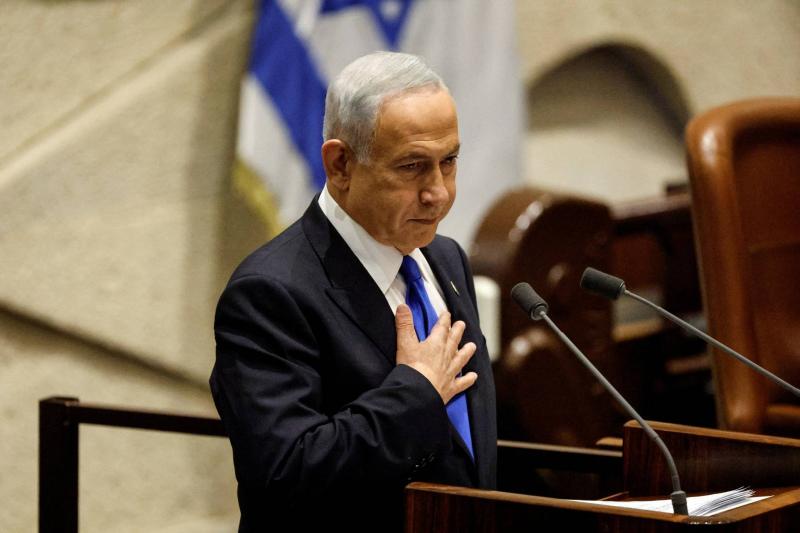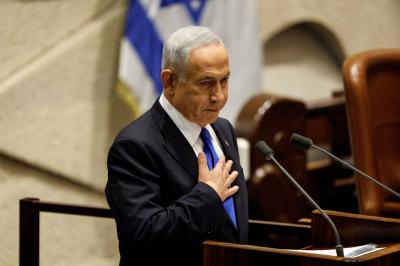After more than three months of war in Gaza, Israeli Prime Minister Benjamin Netanyahu faces opposition from members of the war cabinet due to his strategy, as well as pressure from Washington regarding post-war plans and scrutiny from ministers belonging to the far-right. He also faces increasing demands from the families of hostages still held in Gaza. Here are details about the senior ministers in the government:
**Prime Minister Benjamin Netanyahu**
Netanyahu, who has served the longest term as Israel's Prime Minister, has a reputation as a security hawk due to his time as a junior officer in an elite special forces unit that carried out some of the country’s boldest operations. However, he is facing increasing anger due to failures that led to the October 7 attack. Netanyahu (74), who is serving his sixth term as Prime Minister, heads one of the most right-leaning coalition governments in Israel. He is one of three members in the war cabinet with voting rights on the war strategy in Gaza.
**Defense Minister Yoav Galant**
Galant (65), a member of Netanyahu's conservative Likud party, served as a human frogman in the navy and was set to become the head of the armed forces in 2011 but stepped aside due to allegations of undertaking unauthorized construction on his home. In a statement marking 100 days since the Gaza war began, Galant stated that only military pressure would achieve the twin goals of destroying the Palestinian Islamic resistance movement (Hamas) and freeing hostages, in line with Netanyahu's policy. He also urged the government to set diplomatic goals and discuss post-war plans for the sector. Galant also has voting rights in the war cabinet and has worn only black clothing since the fighting began, expressing that he feels the hostages are like his own children.
**Minister Benny Gantz**
Former Defense Minister Benny Gantz and members of his centrist party agreed to join Netanyahu's coalition government after the Hamas attack. Gantz (64) is considered Netanyahu’s main political rival in opinion polls and is the third member in the war cabinet with voting rights.
**Strategic Affairs Minister Ron Dermer**
Dermer, a former Israeli ambassador to Washington, played a key role in establishing relationships between Israel and both the UAE and Bahrain in 2020 during a diplomatic campaign by the Republican administration of former President Donald Trump. He is a member of the war cabinet.
**Former Chief of Staff of the IDF Gadi Eisenkot**
Eisenkot (63), who lost his youngest son in the fighting in Gaza in December, criticized the war strategy in a television interview on January 19, stating that “an agreement is necessary to free the remaining hostages.” He, too, is a member of the war cabinet and emphasized that “the fate of the hostages should take precedence over other objectives, even if that means missing the opportunity to eliminate Hamas’s political leader.”
**Finance Minister Bezalel Smotrich**
Smotrich, a settler from the West Bank who heads the far-right Religious Zionism party, leads the treasury under a rotation agreement with Aryeh Deri of the Shas religious party. Smotrich (43) opposes the establishment of a Palestinian state. His new responsibilities in the government also include a role within the Ministry of Defense, overseeing West Bank settlements, which he wants to see expand and ultimately annexed to Israel. In response to news of a potential truce with Hamas, he stated that “this would jeopardize the Israeli attack.”
**National Security Minister Itamar Ben Gvir**
Ben Gvir, a settler from the West Bank and leader of the far-right Jewish Power party, heads an expanded ministry responsible for the police. He opposes the establishment of a Palestinian state and calls for the dissolution of the Palestinian Authority formed in the 1990s. He was convicted in 2007 of inciting against Arabs and supporting terrorism, and he is now a lawyer. Responding to news of a ceasefire, he stated, “I prefer the return of the hostages over reaching a bad deal.”
**Foreign Minister Israel Katz**
Katz (68) took on the role of Foreign Minister under a rotation agreement with Eli Cohen (51), who became the Minister of Energy. Both are members of Netanyahu’s conservative Likud party.
**Interior and Health Minister Aryeh Deri**
Deri (64) is a hardline Jewish rabbi and a veteran leader of the Shas party, which has support from religious Jews of Middle Eastern descent. He was barred from holding ministerial positions after legal challenges due to a previous conviction for financial misconduct and has worked informally as an advisor to Netanyahu and other senior decision-makers. The Shas party, along with another hardline party, United Torah Judaism, has raised concerns among secular liberals through demands for social welfare benefits and exemptions from military conscription for its voters.




